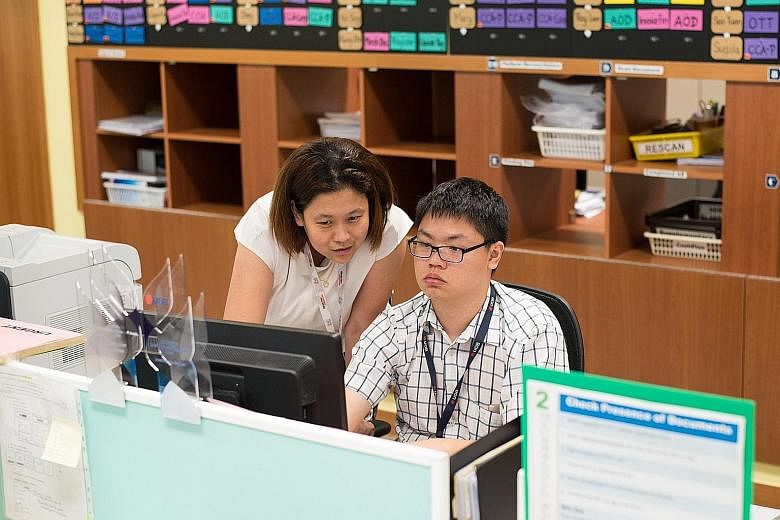Mr Toh Kai Min, 26, enjoys his job. He finds his colleagues helpful and hardworking, and even calls them his brothers and sisters.
He checks and updates clients' applications and scans documents, among other duties, at the UOB Scan Hub, where he works.
Mr Toh, who graduated with a National ITE certificate (Nitec) in electronics from ITE College West, says: "I enjoy my job and find it interesting as I have to work with great accuracy and attention to detail."
But there is a key difference between Mr Toh and many of his colleagues - he has Autism Spectrum Disorder (ASD).
Autism is a complex neurobehavioural condition. Those who have it have difficulties in social interaction and communication, among other things.
Out of the 52 people working at the bank's Scan Hub, Mr Toh is one of 19 people with autism or who have a hearing impairment. The hub's work involves digitalisation and archiving of clients' documents.
The bank's head of group technology and operations Susan Hwee says: "At UOB Scan Hub, people with autism are hired for the strengths they bring to the role, in particular, their attention to detail and high concentration levels. We believe we can shape the business landscape to be more inclusive."
The bank hired its first worker with autism in 2013 and, since then, employee turnover at its Scan Hub has fallen significantly while work productivity has risen sharply, she says.
And this is possible only with the efforts of the Employability and Employment Centre (E2C), which was started in 2012 by the Autism Resource Centre, a charity. It was set up to train those with autism for employment, match them to jobs and give them the support they need.
Those found to be suitable for employment are given an average of three to six months' training in the tasks required for their job. They are also taught "soft skills" such as understanding social norms and asking for help.
E2C head Jacelyn Lim says: "Most people with autism do not intuitively acquire these skills and, as a result, they often face difficulties in the workplace." E2C has placed more than 130 people in jobs ranging from food and beverage positions to administrative roles, and 90 per cent of them are still in their jobs, she adds.
Key to their success is the on-the-job support provided by its job coaches. For instance, there is one job coach who spends a few hours every day at the UOB Scan Hub to help staff with autism learn new processes or cope with changes, among other things.
Those with autism often require predictable routines; hence the need to help them adjust to changes.
"Our support for clients on the job is generally lifelong. However, the intensity of the support varies according to their needs," she says.
Autism can have different degrees of severity.
Besides the Autism Resource Centre, other charities working with those with disabilities, like the Movement for the Intellectually Disabled of Singapore (Minds) and SPD, also have programmes to train, find and support them in jobs.
For example, Minds has placed more than 500 people with intellectual disabilities in cleaning, food and beverage and other jobs since its job programme started in 2010.
Besides ensuring that those with intellectual disabilities are able to carry out their duties at work, a key role of the job coaches is to educate co-workers about the condition and resolve conflicts.
Minds' head of job placement and job support Jaieden Shen says: "Some co-workers may wonder why should they help or mentor the person with an intellectual disability, when they are not paid extra to do so? Some even think the worker is mentally ill, which is not true."
Mr Shen says there are a few co-workers who may feel jealous or threatened by the help and attention given to staff members with an intellectual disability. So the job coaches have to find ways to deal with the unhappiness.
Charities say employers are now more willing to hire people with disabilities. Japanese fashion retailer Uniqlo plans to hire one staff member with intellectual disabilities for each of its stores in Singapore. It now has 30 such workers, mostly in back-end operations.
A Uniqlo spokesman says: "We should not underestimate the capability of people with intellectual disabilities. There are areas in which these individuals can really do well, if they are given support and a push in the right direction."
One such staff member is Mr Benson Tan, 26, who has been working at Uniqlo for the past three years. He unpacks clothes and hangs them on racks, among other duties.
His mother Mimi Tan, 66, says Uniqlo has been a supportive employer and lets Mr Tan work part-time to accommodate his other interest - competitive swimming. Mr Tan trains twice a day and has won medals at the Asean ParaGames. He says: "I'm happy here. My manager is good, and I like my colleagues."
Theresa Tan


